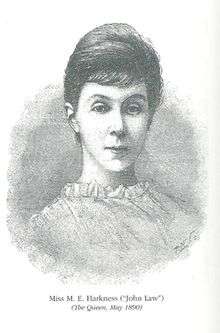Margaret Harkness
| Margaret Harkness | |
|---|---|
 Margaret Harkness aka John Law in 1890 | |
| Born |
28 February 1854 Upton-upon-Severn |
| Died |
10 December 1923 Florence |
| Pen name | John Law |
| Occupation | Writer |
| Nationality | United Kingdom |
| Literary movement | Socialist |
Margaret Elise Harkness aka John Law (28 February 1854 – 10 December 1923) was an English radical journalist and writer.
Life
Harkness was born on 28 February 1854 at Upton-on-Severn in Worcestershire.[1] Her parents were Robert and Jane Waugh Law Harkness.[2] Her father, Robert, was an Anglican priest.[2] She had four siblings and a half sister as her mother had been widowed before she married her father. Her second cousin was the economist Beatrice Webb (also known as Beatrice Potter).[2] She is thought to have taken the name "Law" as part of her nom de plume because it was her mother's maiden name[2] or because she was also a relation of Bishop George Henry Law.[3]
Work
After attending a finishing school in Bournemouth, she left home at the age of 23 to make her living. She there trained as a nurse and worked as a dispenser. Harkness lived in various locations in London with her cousin, Beatrice Webb, in Katherine Buildings near St. Katherine's Dock, where Webb worked as a rent collector. She had a difficult relationship with a Radical politician, Joseph Chamberlain, that ultimately foundered, after which she started thinking of herself as a "glorified spinster," able to devote herself completely to her work.[4]
Writing
In her works of social investigation, Harkness uses a tone of social realism or naturalism, making her different from her male contemporarites.[5] With the financial assistance of her sister and Beatrice Webb she was able to continue living in London, and become a writer. In 1883 she wrote Assyrian Life and History and the following year Egyptian Life and History according to the Monuments.[1] She was introduced to socialism and a group of people who based themselves at the British Museum Reading Room; her friends included her sister Katie, Eleanor Marx, Olive Schreiner, and Annie Besant. Susan David Bernstein argues that this group of women enacted a "transformation of women's work that "entails a proliferation of women's labor across private homes and public spaces.[6]" In 1887 she published A City Girl. Engels gave her advice on her novels where he proposed that she should discuss typical people and situations and not create a stark socialist approach to writing.[7]
In 1888 she wrote her novel Out of Work included descriptions of what happened in Trafalgar Square on 13 November 1887. On that day actions by the police to control a demonstration by the unemployed resulted in injuries, one death and many arrests. One of the arrests was of the socialist John Burns who she would later work with, together with Tom Mann and Henry Hyde Champion, editor of the socialist paper Justice.[3] The novel Captain Lobe followed in 1889. She put her politics into action during the London Dock Strike that year when she is thought to have influenced Cardinal Manning who successfully interceded in the dispute.[8]
In 1905 she published George Eastmont: Wanderer about her life during the 1889 Docks strike when she was briefly a member of the Social Democratic Federation. She described the conditions of the poor in London but she did not make it clear about her contact with Bishop Manning although the book was dedicated to him.
She then became interested in Theosophy and Indian nationalism. The former was from her friendship with Annie Besant but the latter was influenced by her journey to Madras in 1907 to attend the Theosophy national convention. She had an affair with Henry Champion and after this she started to advocate the Salvation Army instead of socialism. Her book In Deepest London documents poverty in the East End and the Salvation Army's approach to the problem.[1] She wrote a book about Indian life which was published as Glimpses of Hidden India in 1907 and as Indian Snapshots in 1912.[3]
At the end of her life she lived in France and then Italy. Her last work A Curate's Promise: a Story of Three Weeks was published in 1921 and she died in Florence in 1923.[3]
References
- 1 2 3 Margaret Harkness, Victorian Web, Retrieved 29 December 2015
- 1 2 3 4 "Contemporary Authors Online". Biography in Context. Gale. 2003. Retrieved January 18, 2015.
- 1 2 3 4 John Lucas, 'Harkness, Margaret Elise (1854–1923)', Oxford Dictionary of National Biography, Oxford University Press, 2004; online edn, May 2005 accessed 29 Dec 2015
- ↑ Nord, Deborah. Walking the Victorian Streets: Women, Representation, and the City. , 1995. Cornell UP.
- ↑ Nord, Deborah. Walking the Victorian Streets: Women, Representation, and the City. Cornell UP.
- ↑ Bernstein, Susan David. Roomscape: Women Writers in the British Museum from George Eliot to Virginia Woolf. Edinburgh UP.
- ↑ Margaret Harkness: 'In Darkest London' – 1889, Flore Janssen, LondonFiction.com, Retrieved 30 December 2015
- ↑ Kent, William. "Henry Edward Manning." The Catholic Encyclopedia. Vol. 9. New York: Robert Appleton Company, 1910. 24 Feb. 2015